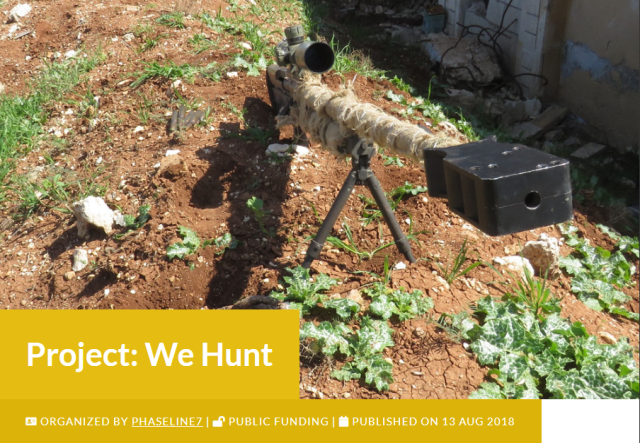“I’m just a guy who sits at home on my laptop looking for this stuff,” says Ben Strick, an Australian-born, Netherlands-based freelance investigator. “I don’t use any special materials, I don’t have any private intelligence-gathering software. I’m not a CIA-trained guy or anything like that.” Despite his lack of formal intelligence training, the 31-year-old Strick recently found some extremely interesting stuff using his laptop: SadaqaCoins, a dark web site he calls “a Kickstarter for jihadists.” He revealed his chilling discovery on Medium in late August.

SadaqaCoins is the first known jihadist cryptocurrency crowdsourcing site on the dark web. (“Sadaqa” is Arabic for “voluntary charity.”) The site, which bills itself as “anonymous and secure,” accepts bitcoin, ether, and Monero, and currently lists three projects in need of funding. (View an archived mirror of SadaqaCoins here.) The most ominous sounding of the bunch is Project: We Hunt, described thusly: “This project aims at equiping [sic] already trained and experienced Snipers with much needed equipment and resources which will inshaAllah [Arabic for ‘if Allah wills it’] be employed in either training exercises or combat operations in the near future.”
So far, none of the projects have received any pledges, yet Strick considers SadaqaCoins a threat that needs to be taken seriously. (He has a theory as to who’s behind it, but isn’t willing to reveal it publicly.) BREAKER recently spoke to Strick about how he discovered SadaqaCoins and why the site is “a big step for these guys.”
What is SadaqaCoins and what does it purport to do?
It’s a basic .onion site on the dark web. It’s set out in a very official way, like you would see a new startup form New York or San Francisco set up on the clear web [internet sites indexed by search engines like Google]. It’s got some stock photos on it. It’s got some blog posts. It seems like they’re trying to do some some SEO [search engine optimization], which I don’t even think works on the dark web. But they’ve got quite a good marketing aspect. They really do have a strong brand name, and they use the same well-designed logo on their Telegram and Twitter profiles. Basically, they want to be a Kickstarter for jihadists.
For the moment, they only have three main projects running. The first project is something for Eid al-Adha, which is an Islamic festival where gifts are given. You can donate a certain amount of bitcoin or Monero or Ethereum, and for about $100 or $200 [worth], you can purchase an entire ram, which will go to feed the jihadis fighting in the Middle East. Another one is for SadaqaCoins itself, to pay for a server, translation fees, a new computer, things like that. And another is to fund lessons for jihadi snipers.
A screenshot from the SadaqaCoins site

That sounds like some scary stuff. How concerned should we be?
Yeah, I don’t like it. I’ve reported on a few of these jihadist websites that are trying to raise money for the “good fight.” None of them so far seem completely affiliated with terrorist agencies, but the issue is, you just don’t know exactly where the money is going.
How did you find the SadaqaCoins site?
I’m always crawling through Twitter using search terms—“jihadist,” “cryptocurrency”—and this time when I did it, these guys popped up, and they had an .onion link in their bio. I thought, Wow, this is the first time I’ve ever seen a jihadist group using an onion link. So I opened it, and I was blown away. I sent the link around to a few different friends with similar interests, and they were also blown away. We wanted to think it was a scam, but there were just too many factors ruling against it being a scam.
That was my initial reaction: How do you know this is real? What points to this not being a scam?
If it is, congratulations to the scammers, because it’s a very elaborate project. But from the wording in the blogs, it’s either written by [a scammer] with a very deep knowledge of jihadist philosophies, or it’s real.
Each of the crowdfunding projects that I told you about has an itemized breakdown of items at the bottom of it. For instance, the sniper project has the price of a sniper rifle, the price of a four-wheel-drive pickup truck, the price of ammunition, the price of a new scope, and you can donate cryptocurrencies for each item. And each of those items has a separate bitcoin address. In the scams that I’ve come across before, they always had a catch-all bitcoin address.
You mentioned that the person or persons who wrote the blog posts has a deep knowledge of jihadism?
The blog posts are very philosophically written. It’s not the typical “Fund the good fight” and all that sort of stuff. I’ve sent the articles to a friend of mine who is a jihadi specialist, and he was shocked as well. He said, “This is impressive content for what it is,” which is a dark web site raising money. So I do believe it’s quite real, and a lot of other people do, but I do want it to be a scam just because I don’t want to see jihadis crowdsourcing on the dark web. It’s something that just doesn’t sit well with me.
When you reported on this, nobody had given any money yet. Is that still the case?
Yeah, that’s correct. There are no funds in there yet, at least on the main bitcoin address. I haven’t recently checked the others.
Are you at all concerned that by publicizing this you’re going to attract potential funders of jihad to this site?
Yes and no. It’s something that sits with me a lot. I don’t want to promote it, but a lot of the people who read stuff that I post on Medium and Twitter are a specific group that’s interested in cybersecurity and privacy issues. However, once it reaches a larger market, perhaps that’s when the danger starts to lurk. I hope, if anything, I can identify [such sites] to law enforcement to start tracking them so they might be able to find out what’s going on.
"At the moment, these guys are running around like cowboys in the Wild, Wild West, with no one chasing after them."
Have you approached law enforcement with this?
Yes. I’ve notified specific police members in cybersecurity in the Netherlands and in Europe. What did they say? “We’ll look into it.”
What else is unique about this site?
This is quite a user-friendly website. If you’re familiar at all with scam websites on the dark web, usually they’re a black page with a picture of maybe a gun, maybe a couple of dead bodies, and a big picture of a hitman. All stock photos, with red text. They look like crap, they look like dog’s vomit, there’s no design whatsoever—they look like scam sites. This one almost looks like a clearnet Kickstarter site. All the links are complete, there’s no problems in the site, it’s all well put together.
Is this the future of jihadist fundraising?
I hope it’s not the future, but I can see how it would work. Because what they’re saying is, and this is one of the main quotes on the website, which I’m just paraphrasing here: “If you cannot win the fight, you are still committed to being part of it.” That’s apparently a quote from the Quran. So essentially: “If you’re well off in the West, send your money to the people who are fighting.”
At the moment, these guys are running around like cowboys in the Wild, Wild West, with no one chasing after them. They’re becoming more and more elaborate about what they’re doing. I think this [site] is a natural evolution. It’s a big step for these guys.
What fuels your passion for investigating sites like this?
I’d like to keep cryptocurrencies clean. To be honest, it’s near impossible. But I just try to do my good part to keep it a little bit clean so that we can see the good side of bitcoin rather than the bad side of it.
This interview has been edited and condensed. Portrait courtesy Ben Strick.